To remove rust stains from a plastic laminate countertop, apply a mixture of baking soda and vinegar to the stain’s surface. Let it rest for two to four hours and scrub the stain away with a soft cloth.
One of the most stain resistant materials that you could ever install as a kitchen counter is laminate. However, one stain that does chemically bond with a plastic laminate or wood coated with laminate is rust.
Ugly orange and brown rust stains will permeate plastic, but they can be removed.
Types of Laminate Countertops
Two types of laminate countertops are commonly installed in kitchens.
One is a plastic laminate and the other is wood that is coated with plastic. Although both of these countertops are quite resistant to all kinds of food stains and damage from bleach and other cleaning products, they are quite vulnerable to rust.
Don’t Leave Wet Metal on Plastic
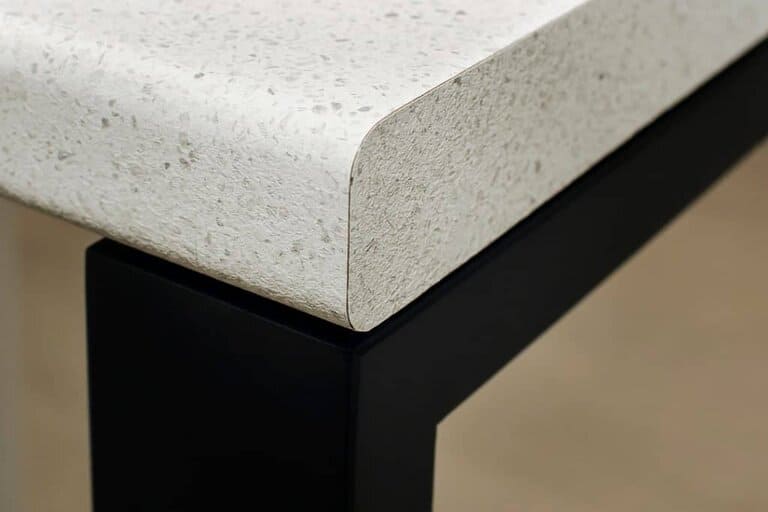
Setting a wet cast iron or metal pot down on your plastic laminate counter won’t immediately stain its surface, but the corrosive process does begin the minute the metal comes into contact with it.
Chances are that a cast iron metal pot left on a laminate counter overnight is going to leave a stain.
Rust stains cannot permeate plastic without the following conditions:
- The plastic counter must be in contact with an oxidative metal such as cast iron.
- It must be wet and the pot or pan must also be left sitting for more than a few hours.
Why Are Rust Stains Hard to Remove?
Rust stains are hard to remove because they are an oxidative reaction.
When in contact with water and air, iron becomes hydrated iron oxide, which is the mineral responsible for leaving orange and brownish rings on your counter. If you have hard water, then there is even more of a likelihood that the counter might stain.
If you should accidentally leave a wet iron pot out on your counter, and should it stain your plastic counter, then here are some do-it-yourself home solutions for remedying the problem.
Dish Soap and Vinegar
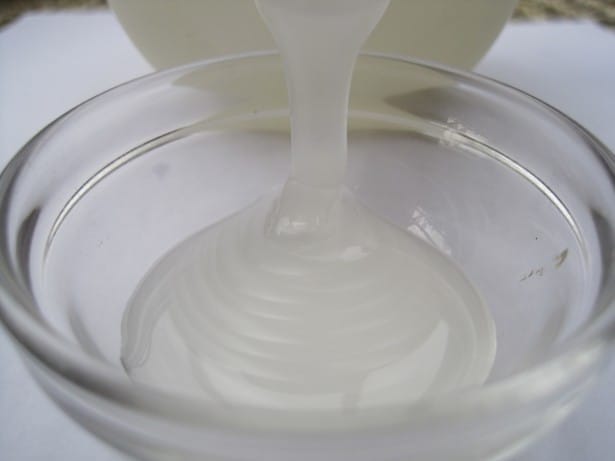
The application of dish soap followed by a coating of vinegar can be an inexpensive and effective rust stain remover.
- Apply the liquid dish soap to the stained area of the counter and leave to permeate the plastic for four hours.
- When you return to the stain, sprinkle about a half a cup of vinegar onto the soap on the counter and scrub the surface vigorously with a plastic scrubber.
Tip: Don’t use a metal or foil scrubber or you could scratch the delicate plastic surface.
- Apply another half cup of vinegar to the stain and let it sit for two hours. The stain should be gone now, but if not, repeat the process.
- If the stain is still present, apply more vinegar and wait yet another two hours.
- Repeat this process until all of the rust stains on your counter have been removed.
Once all of the stains are gone, rinse the counter and make sure that it is dried completely.
The risk of counter damage is low using this non-toxic cleaning method. Your kitchen may reek of vinegar for several hours, as you let the treatment sink into the plastic.
Baking Soda and Vinegar
Here is how to use baking soda and vinegar to remove rust stains from a plastic countertop.
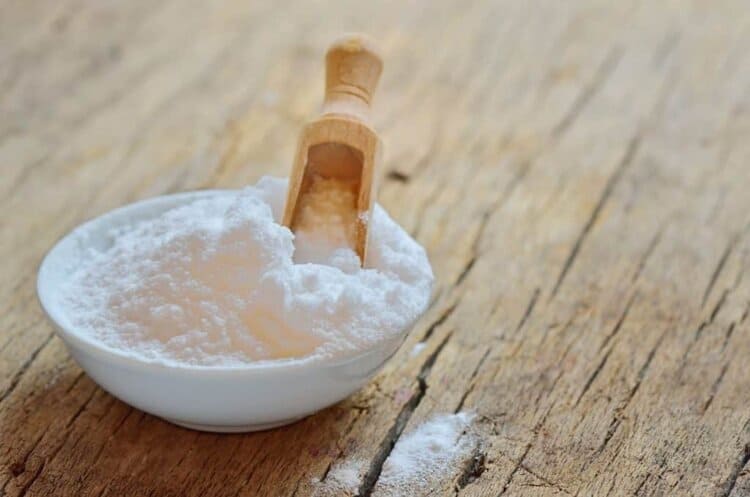
- Mix equal parts of baking soda in a small bowl to make a thick paste. A quarter cup of each should be enough to cover most pot or pan sized rust stains.
- It is normal for the paste to fizz. Spread it across the stain and allow it to do its work. Use a hard sponge to scrub away any stains that seem stubborn.
If this does not remove the rust stain, then walk away and return in about 2 hours.
Remove any remaining paste and see if the stains are gone. If so, rinse the counter well and make sure it is wiped dry.
If the stains are not gone, repeat the process of applying the paste and scrubbing the counter top as many times as necessary.
This rust-stain removal treatment may take several hours to complete, during which time you will be tolerating the smell of vinegar. It also takes quite a bit of elbow grease to completely scrub the stains away.
Baking Soda and Salt
Here is how to make a mildly abrasive scrub using baking soda and salt to remove rust stains.
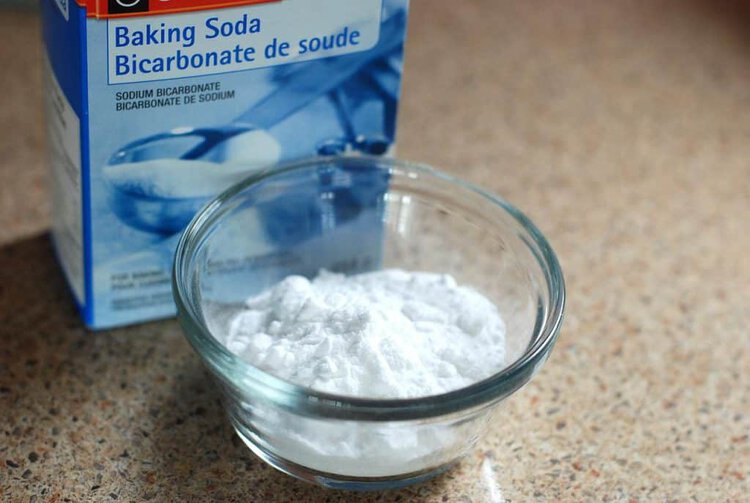
- Mix ¼ of a cup of baking soda with ¼ of a cup of salt to make a mildly abrasive powder.
- Dampen the ends with a rough cotton towel and dip it into the powder.
- Rub the stained parts of the counter vigorously, using tight circular motions, to remove the stains. Tip: Sprinkle a little water on the counter to thicken the scrubbing paste (if needed.)
- Rinse treated areas with cold water, and treat the stained areas a second time or third time if necessary.
- Wipe the counter completely clean and dry it thoroughly with a towel.
Baking soda can be quite abrasive so be quite gentle when you scrub or you could scratch the counter. As an added bonus it will leave your kitchen smelling very fresh and clean.
Lemon Juice
Here is how to remove rust stains from a plastic countertop with lemon juice.
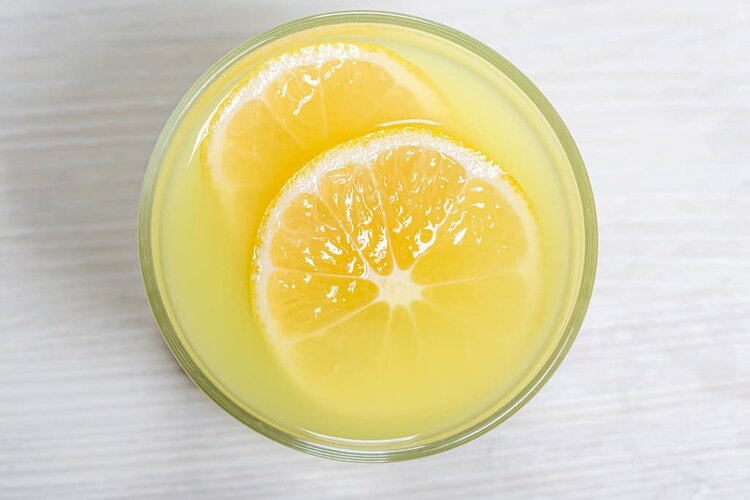
- Mix one tablespoon of lemon juice with ¼ cup of hot water.
- Sprinkle the mixture on the stained part of the counter.
- Scrub hard with a soft plastic scouring pad.
- Scrub the counter with the lemon juice for about 5 minutes and then rinse with cold water.
- Reapply the mixture again if necessary.
- Once the counter is clear of all stains, give it a final rinse and wipe it completely dry with a towel.
Keep in mind that lemon juice has the ability to whiten a plastic counter and also cause a yellowish tint to appear on a white plastic counter.
Cream of Tartar
Here’s how to remove rust stains with cream of tartar:
- Prepare the surface of the stain by dampening it with hot water.
- Sprinkle Cream of Tartar over the affected area. A thick paste will naturally form in the damp areas.
- Let the paste sit on the rust stains for four hours.
- Use a soft kitchen sponge to gently scrub away at the rust stains.
- Once you are done, rinse the paste away with cold water.
- If the stain is not removed completely, repeat the procedure.
This time consuming method of cleaning rust stains has two drawbacks. Cream of Tarter is acidic, so it could yellow a white counter. It is also an abrasive agent that could possibly scratch your countertop.
Coca Cola
Here’s how to use cola to remove rust stains from a plastic counter.
- Soak a soft sponge in Coca-Cola.
- Gently scrub the rust stain.
- Rinse the counter and wipe it clean.
- If the stain is not gone, then repeat this process as many times as necessary, to allow the phosphorus and natural acids in the Coke to dissolve the stain.
Coca Cola is very acidic, so be aware that it could break down the chemical bonds in plastic and possibly cause damage to your counter.
Steam
Here is how to use a blast of hot steam from a hand-held steamer to dissolve a rust stain.
- Prepare your electric hand-held steamer as instructed by its manufacturer.
- Give the surface a shot of steam and then wipe it completely dry with a towel.
- Repeat until the stain is gone.
- Be sure to wipe up all remaining water with an absorbent towel to avoid soaking the counter and causing the rust stain to spread.
Be careful not to burn your hands when using a steamer. Apply the steam and then wipe.
FAQs On How to Remove Rust From Countertop
Does a Rust Stain on a Laminate Countertop Spread and Get Bigger?
It won’t spread unless you leave the counter very wet for an extended period of time or leave a damp cloth on top of the stain.
Can I Use Bleach to Remove Rust Stains From Plastic Countertops?
Depending on what it is made of, bleach mixed with plastic can emit very toxic fumes. Over time, it can also eat into the plastic material and soften in it, making it more vulnerable to scratches and marks.
Can I Use Toothpaste to Remove Rust Stains From Plastic?
Whiteners in tooth paste might yellow the counter and abrasives in toothpaste can scratch the counter.